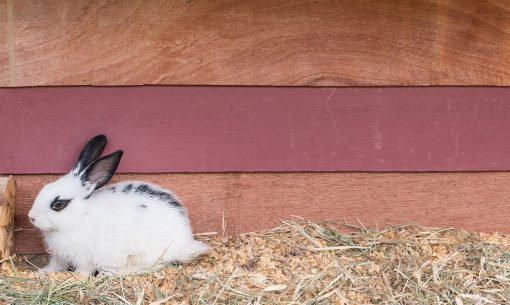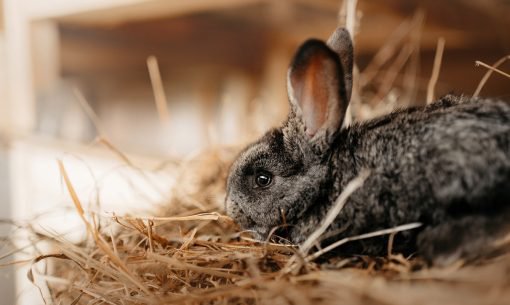How long do rabbits live?
According to Guinness World Records the oldest rabbit ever was a wild rabbit called Flopsy, who lived to the astonishing age of 18 years and 10.75 months. Flopsy was of course at one end of the spectrum, and longevity to quite this degree is not the reality for most pet rabbits.
So, how long do rabbits live? Just two decades ago, few rabbits lived to what we now consider as ‘old age’, with average lifespans in the region of five to seven years1. However, huge improvements have been made in rabbit nutrition and husbandry, as well as veterinary care and knowledge, and the picture has changed; these days, we can look forward to as many as ten to fourteen years with our bunny friends2.
How long do rabbits live in the wild?
It’s not such great news for the wild rabbit population though. On average, wild buns can expect to live a mere two or three years. As a prey species, a long life is not the norm, and many die in infancy. It is not just being predated on though; our pampered pets have the benefit of a ready supply of tasty species-specific nutrition not always available in the wild, and this plays a key role in the longer life our pet pals enjoy.

Which rabbit breeds live the longest?
Whether you are already pet parent to a bun, or a thinking of getting a new four-legged friend, you may find yourself wondering which rabbit breeds live the longest. Well, just as in dogs, the average lifespan of a rabbit varies according to breed and size. Larger breeds tend to have a shorter life expectancy than smaller breeds and pure breeds tend to live for a shorter time than mixed. So, a Netherland dwarf might be expected to live for 12 or 13 years, whereas for a French lop it would be closer to six or seven years.
Of course there is lots that you can do to keep rabbits of all breeds and sizes happy and healthy, and feeding a nutritionally optimal diet, is often just as important as genetics or any breed-related trends.

What is the best diet for rabbits?
In years gone by, many rabbits were fed unsuitable diets that were not well aligned with natural nutrition. As knowledge has increased, diets have evolved to mirror wild diets and better support small pet health and wellbeing, and this has been a major contributor to increasing lifespans.
Top of the list? … it has to be fibre, and lots of it. There is no doubt that knowledge around high fibre diets and the ad lib feeding of hay has been instrumental in improving rabbit digestive and dental health. Coming a close second is sugar, or rather the lack of it. The feeding of ‘no added sugar’ diets is also key to reducing levels of obesity.
New methods of manufacturing diets are important too. Take extruded nuggets for example. The extrusion process means the nuggets have a delicious crunchy texture that small pets love, with no need for sugary syrups to improve flavour or to act as binding agents.

Food For Life: life span, life stage and longevity
Puppy and kitten foods have been widely available for years. Well did you know that diets tailored for different life stages are just as important for rabbits? In fact, providing nutrition tailored to life stage, helps support optimal wellbeing and longer lifespans.
If you are welcoming the pitter-patter of tiny paws into your life, a junior diet will help to give your new friend the very best start in life. Science Selective Junior Rabbit Food…
- Is tailored to the needs of young animals
- Has higher protein to support growth
- Has correctly balanced calcium and phosphorus to support healthy skeletal development
- Is suitable for all rabbits up to 20 weeks of age

What should I feed my older rabbit?
Diets tailored to the needs of more senior rabbits are no less important, and recommending a senior diet such as Science Selective Four+ Rabbit Food, is one of the best ways to support the health and wellbeing of older buns. Obesity and arthritis are two of the most common health issues in older pets, including rabbits, so it is important to feed a diet that minimises the risks of these conditions. Science Selective Four+ Rabbit Food…
- Has a reduced protein and energy content to help maintain a healthy weight
- Has a calcium to phosphorus ratio optimised for joint support
- Has tasty Timothy hay and thyme to stimulate older appetites
- Is suitable for all rabbits from four years of age

How to care for my older rabbit
If your rabbit has reached the realms of seniority you may well wonder what you can do to help care for them. Well, just as in other species, advancing years means an increased risk of health problems such as arthritis. So, how can you keep them happy and healthy for as long as possible? Feeding a diet tailored to their life stage is one part of the equation, but here are some adjustments to living quarters that your older bun may appreciate too:
- Anti-slip mats on tiled or wooden floors
- Accessible litter trays, with a side cut out if necessary
- Ramps to access higher levels of living accommodation
- Help with grooming for those hard to reach areas
So, not many rabbits will match Flopsy’s record, but today’s pet rabbits can look forward to many happy years with us. Great news for all concerned!
References
1. Meredith, A. (2014) Biology, Anatomy and Physiology. In A. Meredith, & B. Lord (Eds.), BSAVA Manual of Rabbit Medicine (pp. 1-13). BSAVA
2. Harcourt-Brown, F. (2002) Textbook of Rabbit Medicine






